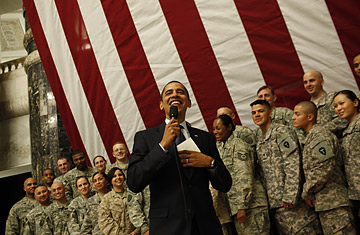
President Barack Obama greets military personnel at the Camp Victory U.S. military base in Baghdad
The Nobel Peace Prize offers its recipients one of the most powerful platforms in the world. Winners get immediate global attention and the chance to meet and influence leaders and governments everywhere. Think of it as a megaphone through which worthy — and very often obscure — activists or politicians or environmentalists can shout their message to a gathered crowd.
That's just one of the reasons the Nobel Committee's decision to award this year's Peace Prize to Barack Obama is such a stunning surprise. Obama has the world's most powerful platform: the White House. And you don't need a megaphone when you're the U.S. President. You speak, and people listen.
The five-member Nobel Committee in Norway said Obama was awarded the Peace Prize for "his extraordinary efforts to strengthen international diplomacy and cooperation between peoples" and highlighted Obama's promotion of nuclear disarmament. "Only very rarely has a person to the same extent as Obama captured the world's attention and given its people hope for a better future," the committee said in announcing the prize. "His diplomacy is founded in the concept that those who are to lead the world must do so on the basis of values and attitudes that are shared by the majority of the world's population."
That's all true. But Obama has been in office eight months. His ambitious plans for a peace deal in the Middle East and a nuclear-free world are just getting started. No doubt the Nobel Committee want this prize to add momentum to those plans. But the award also risks adding to the huge burden of expectations that Obama carried when he entered office. The reality of governing has already proved how ridiculous many of those expectations were.
And now Obama is the Nobel Peace Prize winner. "Frankly, it seems premature when he hasn't been in office even a year yet and has not yet actually achieved the goals he set out — although he certainly has made some very noteworthy efforts," says Mark Fitzpatrick, senior fellow for nonproliferation at the London-based International Institute of Strategic Studies. "I think he will be embarrassed by it, and it will be unhelpful in the domestic milieu."
That's an understatement. As TIME's Mark Halperin notes on The Page, "Barack Obama's critics have long accused him of being a man of 'just words,' rather than concrete actions and accomplishments. The stunning decision to award him the Nobel Peace Prize for, basically, his rhetoric, will almost certainly infuriate his detractors in America more than it will delight his supporters."
"Conservatives in America," Halperin continues, "many of whom recently expressed joy that Obama failed on the international stage in his hands-on bid to win the Olympic Games for Chicago, will denounce Obama's award as a farce. Even some neutral critics will agree that the honor seems, at a minimum, premature."
Fitzpatrick and his colleagues at the International Institute of Strategic Studies reacted in the same way: "Is this a joke? We all thought it was a joke."
— With reporting by Mark Halperin / Washington and Catherine Mayer / London
